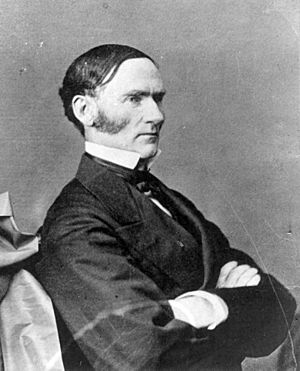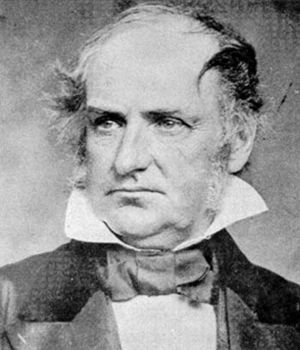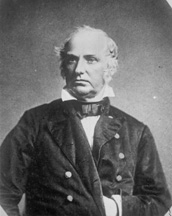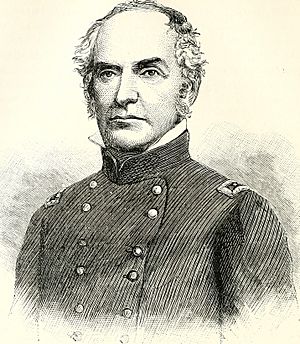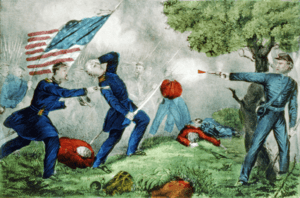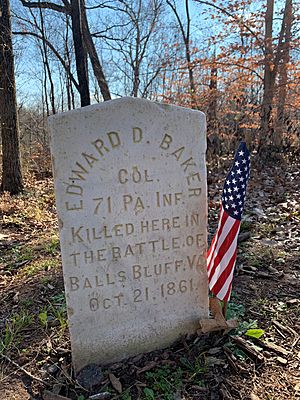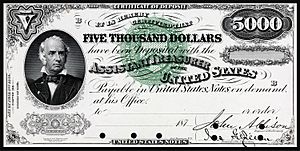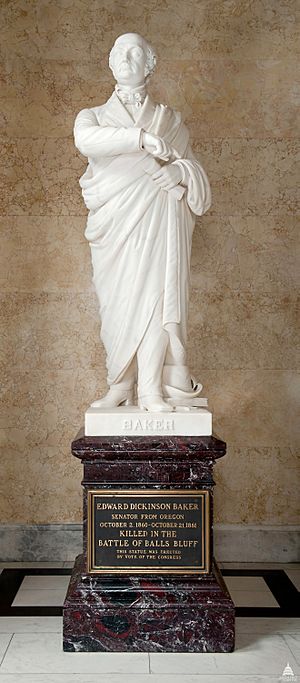Edward Dickinson Baker facts for kids
Quick facts for kids
Edward Baker
|
|
|---|---|
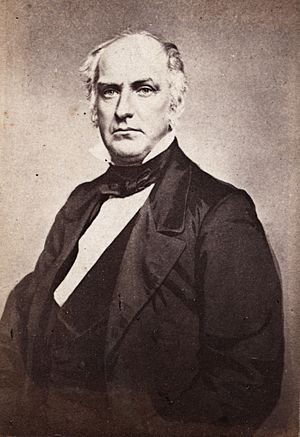 |
|
| United States Senator from Oregon |
|
| In office October 2, 1860 – October 21, 1861 |
|
| Preceded by | Delazon Smith |
| Succeeded by | Benjamin Stark |
| Member of the U.S. House of Representatives from Illinois |
|
| In office March 4, 1845 – January 15, 1847 |
|
| Preceded by | John J. Hardin |
| Succeeded by | John Henry |
| Constituency | 7th district |
| In office March 4, 1849 – March 3, 1851 |
|
| Preceded by | Thomas J. Turner |
| Succeeded by | Thompson Campbell |
| Constituency | 6th district |
| Member of the Illinois Senate | |
| In office 1840–1844 |
|
| Member of the Illinois House of Representatives | |
| In office 1837–1840 |
|
| Personal details | |
| Born |
Edward Dickinson Baker
February 24, 1811 London, England, UK |
| Died | October 21, 1861 (aged 50) Ball's Bluff, Virginia |
| Political party | Whig (before 1854) Free Soil (1854–1859) Republican (1859–1861) |
| Spouse | Mary Lee |
| Children | 5 |
| Signature | |
| Military service | |
| Allegiance | United States • Union |
| Branch/service | United States Army • Union Army |
| Years of service | 1846–1847 1861 |
| Rank | Colonel |
| Commands | 4th Illinois Infantry 3rd Brigade, 3rd Division 3rd Volunteer Division (temporary) 71st Pennsylvania Infantry Regiment Philadelphia Brigade |
| Battles/wars | Mexican–American War • Battle of Cerro Gordo American Civil War • Battle of Ball's Bluff † |
Edward Dickinson Baker (born February 24, 1811 – died October 21, 1861) was an American politician, lawyer, and army officer. He served in the U.S. House of Representatives for Illinois. Later, he became a U.S. Senator representing Oregon. Baker was also known for his powerful speeches and poetry. He was a close friend of President Abraham Lincoln. Baker served as a colonel in the U.S. Army during both the Mexican–American War and the American Civil War. He was killed while leading his Union Army regiment in the Battle of Ball's Bluff. This made him the only sitting U.S. senator ever to die in a military battle.
Contents
Edward Baker's Early Life and Education
Edward Baker was born in London, England, in 1811. His parents, Edward and Lucy Baker, were school teachers and members of the Quakers. They were educated but not wealthy. In 1816, when Edward was five, his family moved to the United States. They arrived in Philadelphia, where his father opened a school. Young Edward, often called Ned, went to his father's school. He later worked as an apprentice in a weaving factory.
In 1825, his family moved to New Harmony, Indiana. This was a special community on the Ohio River. It was led by Robert Owen and aimed to create a perfect society where people shared everything. The family left New Harmony in 1826. They moved to Belleville in Illinois Territory, near St. Louis. Baker and his father started a business using a horse and cart to move goods. Ned operated this business in St. Louis.
Baker met Governor Ninian Edwards, who let him use his private law library. This helped Baker study law. He later moved to Carrollton, Illinois. In 1830, he officially became a lawyer.
Marriage and Family Life
On April 27, 1831, Edward Baker married Mary Ann Foss. They had five children together.
Edward Baker's Career as an Illinois Lawyer
After getting married, Baker joined the Disciples of Christ church. He also preached part-time. This helped him become known for his excellent public speaking skills. These skills later made him famous. In 1832, Baker took part in the Black Hawk War. However, he did not fight in any battles.
Around 1835, he became friends with Abraham Lincoln. Soon, Baker got involved in local politics. On July 1, 1837, he was elected to the Illinois House of Representatives. He then served in the Illinois Senate from 1840 to 1844.
In 1844, while living in Springfield, Baker ran for the 7th U.S. congressional seat. He won the nomination against Lincoln and was elected as a Whig. Baker and Lincoln became very close friends. Some even claimed Baker baptized Lincoln, but this story is not confirmed by church leaders.
In September 1844, Baker showed great bravery. This happened after Joseph Smith, the founder of the Latter Day Saint movement, was killed by a mob. Baker was a colonel in the local militia. He was part of a group chasing the mob leaders who had fled into Missouri. Instead of waiting, Baker crossed the Mississippi River alone and captured the fugitives.
Baker served in Congress from March 4, 1845, until he resigned on December 24, 1846. His resignation became official on January 15, 1847. He resigned because of a disagreement about whether he could serve in Congress and the army at the same time. The U.S. Constitution has a rule, the Incompatibility Clause, which says a U.S. officer cannot serve in Congress.
Despite this, Baker and Lincoln remained close friends. Lincoln even named one of his sons Edward Baker Lincoln, who was lovingly called "Eddie." Lincoln and Baker sometimes played Fives, a type of handball, together.
Military Service and Political Return
During the Mexican–American War, Baker took a break from politics. On July 4, 1846, he became a colonel of the Fourth Regiment of the Illinois Volunteer Infantry. In the Battle of Cerro Gordo, Baker's regiment was part of General James Shields's brigade. When General Shields was badly hurt, Baker bravely led the brigade. They attacked an enemy artillery battery and captured their guns. General Winfield Scott praised Baker's leadership.
Soon after Cerro Gordo, the soldiers' enlistment ended. Baker's regiment returned to New Orleans and was discharged on May 25, 1847. Baker went back to Springfield in 1848. Instead of running against Lincoln for Congress again, Baker moved to Galena. There, he was nominated and elected as a Whig to the 31st Congress (March 4, 1849 – March 4, 1851). He did not seek re-election in 1850.
In July 1850, Baker offered to help the Panama Railroad Company. He would recruit men to build the railroad. Baker agreed to pay their travel costs from St. Louis and in Panama. The company would then send them to San Francisco. Baker became sick with a tropical illness in Panama and had to return to the U.S.
Return to Military Service
After a 14-year break from military service, Baker returned to the army. This was at the start of the American Civil War. President Abraham Lincoln asked for 75,000 volunteers after Fort Sumter fell in April 1861. Baker quickly raised a regiment, recruiting soldiers from New York City and Philadelphia.
He was offered a promotion to brigadier-general on May 17, 1861, but he turned it down. Instead, he chose to serve as the colonel of the Seventy-first Regiment, Pennsylvania Volunteer Infantry. His time in this role was short.
California Politician
After not getting a Cabinet position under President Zachary Taylor, Baker moved to San Francisco in 1852. He started a successful law practice. Some people said he was not very organized, but he still did well. Baker met Isaac J. Wistar, who was 16 years younger. Wistar said Baker didn't keep good records and relied on his memory. Baker preferred to speak without much preparation when arguing cases in court. He earned a lot of money but spent it quickly.
California became a free state in 1850. But by the late 1850s, people in the state had different ideas about slavery. Baker became a leader in the effort to keep California loyal to the Union. In 1855, he ran for a seat in the state senate as a Whig on the Free Soil Party ticket. He lost because the Whig party was losing power.
During this time, Baker became known as "Gray Eagle." This nickname came from a poem by John Neal and referred to Baker's gray hair, even though he was balding. He was just under six feet tall. Baker became involved in a legal case in 1855 that affected his career. He defended Charles Cora, a gambler accused of killing a U.S. marshal. The jury could not agree on a verdict. This experience led Baker to join the Law and Order Party. This group was against the actions of the San Francisco Committee of Vigilance, which sometimes took the law into its own hands. Because of criticism from this committee, Baker left the city for a while and spent time in the Sacramento area.
Oregon Politician and Senator
Baker was disappointed when he failed to win a U.S. House seat in 1859. He then looked to Oregon for new political opportunities. Many people he knew from Illinois had moved there. In 1857, his friend Dr. Anson Henry, who had moved to Oregon, told Baker he could win a Senate election there. After Oregon became a state on February 14, 1859, Republicans in Oregon asked Baker to come and run for the Senate. They hoped he could help balance the strong Democratic presence there.
By late February 1860, the Baker family had moved to Salem, Oregon. Baker opened a law office and began campaigning for Republicans across the state. On July 4 in Salem, he spoke about the threats of states leaving the Union. He declared he was willing to die for his country.
The Oregon Legislative Assembly met in Salem in September 1860 to elect two senators. To stop Baker from getting enough votes, six pro-slavery senators left the meeting and hid. They were brought back, and on October 7, the legislators reached an agreement. They elected James Nesmith, a Democrat, and Baker. The Democrats who supported Stephen Douglas also supported Baker because of his honesty and his belief in popular sovereignty (the idea that people in a territory should decide on slavery for themselves).
Serving in the U.S. Senate
Baker officially became a senator on December 5, 1860. His fellow Oregon Senator, Joseph Lane, disliked him so much that he refused to introduce Baker to the Senate. So, Democratic senator Milton Latham of California did it instead.
On December 31, Senator Judah Benjamin of Louisiana argued that Southern states had a right to leave the Union. He said other states would soon follow South Carolina, which had already left on December 20. Baker spoke for three hours the next day, disagreeing with Benjamin. He said he was against interfering with slave owners in states where slavery already existed. However, he was strongly against states leaving the Union and against allowing slavery to spread into new territories. In March 1861, he showed he was willing to find common ground to prevent the country from breaking apart.
Lincoln's Inauguration
Abraham Lincoln became president on March 4, 1861. Baker and Senator James A. Pearce rode in the presidential carriage with Lincoln and the outgoing president, James Buchanan. Colonel Charles Pomeroy Stone, a rising Union officer, was in charge of security for the inauguration. He rode his horse to make the other horses in the escort excited. He believed prancing horses would create a better protective barrier for the important people in the carriage. Baker introduced Lincoln to the crowd gathered at the Capitol, saying, "Fellow citizens, I introduce to you, Abraham Lincoln, President of the United States."
Lincoln did not choose Baker for his cabinet. This was because Baker's support in the Senate was very important. If Baker had resigned his Senate seat, Oregon's pro-slavery Democratic governor, John Whiteaker, would have appointed a pro-slavery Democrat in his place.
Death in Battle
The American Civil War began on April 12, 1861, when Confederate forces attacked Fort Sumter. Three days later, President Lincoln asked for 75,000 volunteers. Baker left the Senate and went to New York City. On April 19, he spoke for two hours to a huge crowd of 100,000 people in Union Square. He spoke directly, saying, "The time for talking is over; the time for battle is here. Our country needs every man to do his duty." He also said he was ready to fight: "If it is meant to be, this weak hand will draw a sword, never before dishonored, not to fight for glory in a foreign land, but for my country, for my home, for law, for government, for the Constitution, for what is right, for freedom, for humanity."
The next day, he met with 200 men from California. They wanted to form a regiment to show that the West Coast supported the Union. On May 8, Secretary of War Simon Cameron allowed Baker to form the California Regiment. Baker would be its commanding officer with the rank of colonel.
Baker asked Isaac J. Wistar, his law partner from San Francisco, to help recruit and organize the regiment in Philadelphia. Baker told Wistar that he couldn't accept a higher military rank yet because it might make him lose his Senate seat. But he promised Wistar that he would become a Major-General within six months and Wistar would become a Brigadier-General under him. On June 11, Baker wrote to Lincoln, asking for a command that would not make him "second to everybody." His efforts paid off. On July 31, Lincoln sent the Senate a list of men he recommended for brigadier general appointments. Edward Baker was on that list, along with Charles Stone and Ulysses Grant.
Baker told the Senate he would refuse the brigadier general commission because of legal doubts. He said he was happy to have a command as a colonel, which was "quite enough for all my military goals." This suggests he believed he could be a colonel and stay in the Senate. On August 31, he wrote to Lincoln to decline the brigadier general appointment, mentioning the problem of the Incompatibility Clause. However, on September 21, the War Department told Baker that Lincoln had appointed him a major general. While some records show Baker as a major general, the U.S. Senate states he was a colonel.
Baker was given command of a brigade in Stone's division. They guarded river crossings along the Potomac River north of Washington. In August, Baker had dinner with journalist George Wilkes. Baker predicted he would die in an early battle of the war. He said, "I am sure I will not live through this war. If my troops hesitate, I will fall in the first battle. After my career in Mexico and as a Senator, I cannot turn away from the enemy."
On October 20, Baker visited his old friend Lincoln at the White House. Lincoln sat under a tree on the lawn, while Baker lay on the ground. Lincoln's son, Willie Lincoln, played in the leaves nearby. Baker picked up Willie and kissed him before shaking the President's hand as he left. Mary Lincoln gave Baker a bouquet of flowers. He accepted them sadly, saying, "Very beautiful. These flowers and my memory will fade together."
On October 21, a false report about an unguarded Confederate camp at Ball's Bluff led Brig. Gen. Charles Pomeroy Stone to order a raid. The Union troops clashed with enemy forces. Baker tried to send more Union soldiers, but he failed to make sure there were enough boats for the river crossings. This caused delays. Around four o’clock, Baker was hit by many bullets and died instantly.
President Lincoln was at General George McClellan's headquarters that evening when he heard the news of Baker's death. Charles Carleton Coffin of the Boston Journal saw Lincoln crying. He described Lincoln with "bowed head, and tears rolling down his furrowed cheeks, his face pale and tired, his heart filled with sadness." After funerals in Philadelphia and New York City, Baker's body was sent by ship and the Panama Railroad to San Francisco for burial. He is buried in the San Francisco National Cemetery.
Baker once said, "my real strength is my ability to command, to lead men. I feel that I could lead men anywhere." However, his friends thought his true talent was his gift for public speaking.
His death shocked Washington and led to the creation of the Congressional Joint Committee on the Conduct of the War. Almost three years after his death, Baker's widow, Mary Ann, began receiving a government pension of $50 per month.
Honors and Legacy
Edward Baker has been honored in many ways:
- Baker City, Oregon and Baker County, Oregon, are named after him. The county was created on September 22, 1862.
- Fort Baker, in the Las Vegas Valley of Nevada, was built in 1864 and named in his honor.
- On April 29, 1897, the Lime Point Military Reservation near Sausalito, California, was renamed Fort Baker in his honor.
- There is also a Fort Baker in Washington, D.C., named for him. It is located between Forts Meigs and Stanton.
- A life-size marble statue of Baker was made by Horatio Stone. It is located in the Capitol Building. Congress provided $10,000 for its creation.
- On December 12, 1861, after Baker's death was announced, Senator James W. Nesmith of Oregon proposed a resolution. It stated that Senate members would wear black armbands for thirty days to show mourning.
- There is a plaster carving of his face at the Illinois State Capitol building in Springfield, Illinois. It is carved into the wall in the legal library.
- San Francisco's Baker Street is named after him. It runs from Haight Street to Marina Boulevard.
- On May 19, 2011, Oregon Governor John Kitzhaber signed a law. It made February 24 Edward D. Baker Day in Oregon. This was at the request of local members of the Sons of Union Veterans of the Civil War.
- On October 23, 2011, the Oregon Civil War Sesquicentennial Commission held a special event. It honored Baker's life and public service in Salem, Oregon. It was held at the exact time of his death at the Battle of Ball's Bluff, 150 years earlier. A similar event was held in Leesburg, Virginia.
See also
 | DeHart Hubbard |
 | Wilma Rudolph |
 | Jesse Owens |
 | Jackie Joyner-Kersee |
 | Major Taylor |


